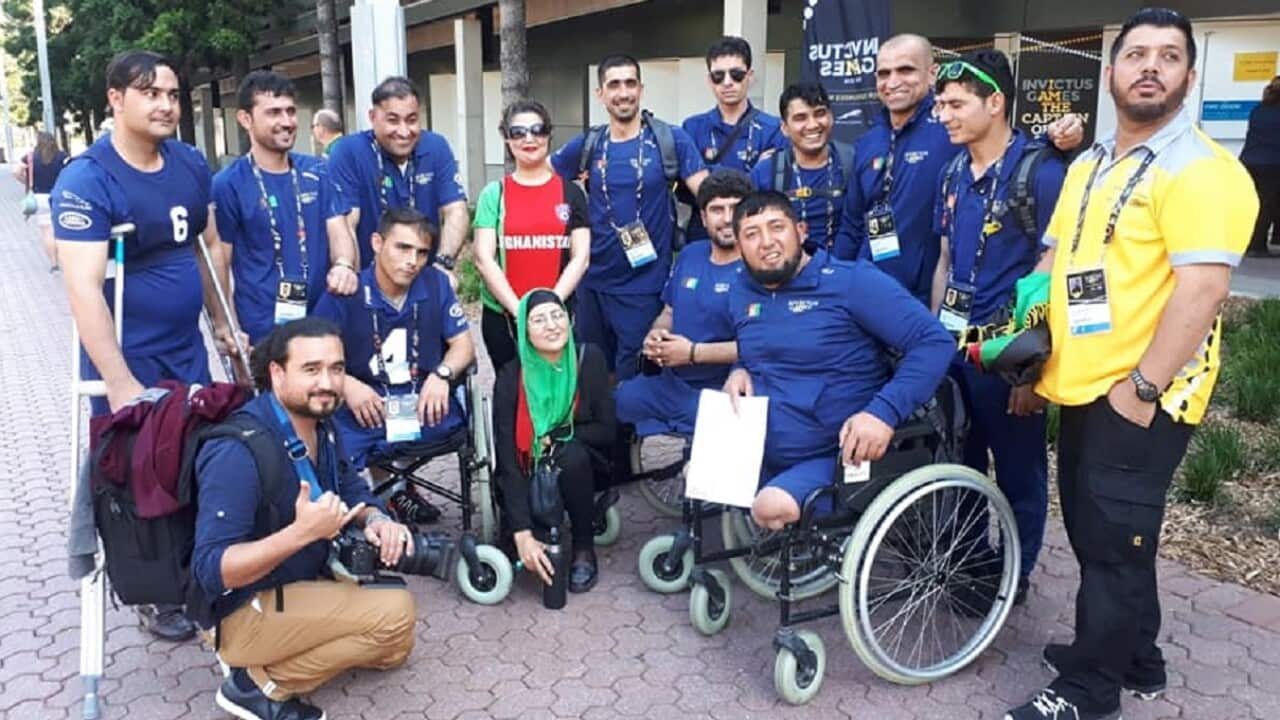Afghani war veteran and amputee Reyaz Talash hasn’t had much to smile about in recent years.
Now he can’t stop beaming.
“I was waiting for my visa, when I got it I became very happy,” the 24-year-old says on a sunny Autumn afternoon in western Sydney.
“When I heard the news, we were expressing our happiness; I was dancing.” For the group of six men, who live with disabilities, it’s a remarkable change from when SBS first met them last December.
For the group of six men, who live with disabilities, it’s a remarkable change from when SBS first met them last December.

The men are all Afghan National Army veterans and some sustained injuries while fighting the Taliban alongside western coalition forces, including Australia. Source: SBS
Then, the five who competed in volleyball and weight lifting, and one official, were anxious about their future. They were staying temporarily at the house of a member of the Afghan Australian community, having fled the Invictus Games in October to seek asylum.
They all expressed fear at returning home to Afghanistan, saying their participation in the games - an annual sporting event for wounded war veterans, founded by Prince Harry - had made them targets of the Taliban.
The men are all Afghan National Army veterans and some sustained injuries while fighting the Taliban alongside western coalition forces, including Australia.
Naseri, 31, was working on a joint patrol with British forces in Helmand province when he lost both of his legs to a landmine.
“I gave the physical part of my body to Afghanistan, to my home country, but I will give my brain to Australia,” he said.
Four of the men are now studying English and computer skills at Granville TAFE and hope to get jobs. They are living in a nearby share house and one of the other men is already working as a labourer.
Sohail Naseri and Abdul Wali Ahmadzai, both double amputees in their late twenties and early thirties, have been gifted electric mobility scooters from a local Islamic charity and zip around the campus during the interview.
They are excited at now being able to plan for their future.
“It is not fun to only sit at home and not do anything, not work. I hope I can get legs, I want to be standing on my feet so that I can study and then work,” Ahmadzai said. Having arrived in Australia legally and meeting the character test, , meaning they can live and work in Australia permanently, as well as sponsoring eligible family members.
Having arrived in Australia legally and meeting the character test, , meaning they can live and work in Australia permanently, as well as sponsoring eligible family members.

Four of the men are now studying English and computer skills and hope to get jobs. Source: SBS
The group’s lawyer Alison Battisson from Human Rights For All said the visa result was a sign of how strong the men’s claims for asylum were.
“It acknowledges that all of them have been through extreme hardship … it also shows that resisting and fighting the Taliban is being acknowledged by the international community,” she said.
But while not surprised at the outcome, “it is rare in the current climate for that number of permanent protection visas to be granted,” she said. Abdul Wahli Ahmed Zai said he was cooking when he received news of the visas.
Abdul Wahli Ahmed Zai said he was cooking when he received news of the visas.

Sohail Naseri. Source: SBS
"I felt really happy, in fact really happy, thanks to the Australian government," he said.
"I want to live a peaceful life here, now the Australian government gave us the visa, but if they can help to give us legs as well. To give us legs so that we can go to TAFE and study and be able to work as well. It is not fun to only sit at home and not do anything, not work. I want to be standing on my feet so that I can study and then work."
The men are still trying to and seek financial support to buy and be fitted with new prosthetic limbs.
Prominent Australian orthopaedic surgeon and Iraqi refugee Dr Munjed Al Muderis has offered his services pro bono to the group, but they are still in need of funding to buy the prosthetic limbs and pay for hospital costs.
Some of the men who have wives and children back in Afghanistan are hoping they can join them in Australia.
Mr Naseri is a married father of four - he hasn’t seen his family for seven months.
“It is now my children, they could be safe and able to get an education and have a good future here,” he said. “We have spent our life in an unpleasant environment, now I want my children to be out of that environment and be here.”
“We have spent our life in an unpleasant environment, now I want my children to be out of that environment and be here.”

The group’s lawyer Alison Battisson from Human Rights For All said the visa result was a sign of how strong the men’s claims for asylum were. Source: SBS
While the group are still working on their English, they are now preparing for the next stage of their lives in Australia, and want to say thank you.
Aminullah Arsalan, 26, said he now felt like a part of Australia.
“We came here with real danger that our lives were facing. So we have been given this visa and we were not rejected, so I am very thankful to the government,” he said.




